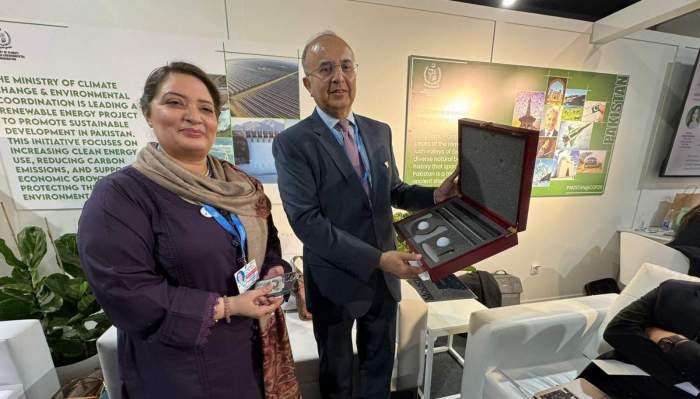She made these remarks in the context of a high-level ‘Judicial Pathways Towards Climate Justice: Judicial Approaches for Addressing Climate Change Through Global Analysis’ held on Friday at the Pakistan Pavilion on the sidelines of the UN-led global climate summit.
The Prime Minister's climate aide revealed that it was basically her initiative to establish a platform for international judges dedicated to climate justice as a part of Pakistan’s push for climate finance for global south and today’s event was an step towards that objective.
Alam explained, "I am pleased to have successfully organised a panel discussion that brought together judges to explore the crucial and expanding role of courts in tackling climate change in the Asia-Pacific region."
She further highlighted the growing importance of judicial systems in the face of escalating climate impacts, noting that courts have become vital spaces for addressing climate justice. These judicial bodies are tasked with balancing the urgent environmental challenges with the socio-economic and developmental needs, particularly in the Global South, where such issues are especially pressing, Romina Khurshid Alam added.
In the high-powered panel discussion at the Pakistan Pavilion on the sidelines of COP29, global judicial leaders, alongside Pakistan’s climate experts, emphasized the critical role of the judiciary in addressing the climate crisis and ensuring climate justice.
The judicial experts highlighted the urgent need for a global judicial coalition to hold governments and corporations accountable in the fight against climate change and demand financial flows from global north to global south.
Senator Sherry Rehman, Chairperson of Pakistan’s Senate Standing Committee on Climate Change, opened the discussion with a stark reminder of the growing climate crisis. She stressed that while Pakistan contributes less than one percent of global carbon emissions, it remains one of the most vulnerable nations to climate-related disasters, including the catastrophic 2022 floods that affected one-third of the country.
Senator Rehman underscored the growing gap in climate finance and the need for an equitable distribution of resources to help vulnerable nations adapt to the impacts of climate change.
“The tool that will unlock justice for the Global South is climate finance,” she said. “But the financing gap is widening, and the Global South is being left behind.”
The panel, which featured prominent judges and legal experts from around the world, explored how judicial systems can play a pivotal role in advancing climate justice.
Justice Mansoor Ali Shah of the Supreme Court of pakistan, who chaired the session, emphasized that climate finance is now a fundamental human right.
He lauded the Prime Minister's Coordinator for Climate Change, Romina Khurshid Alam, for organising a panel discussion on judicial approaches to addressing climate change in the Asia-Pacific region.
“Without climate finance, there is no mitigation or adaptation,” he stated. “It is the lifeline for climate resilience, and the Global South cannot bear the burden alone.” Justice Shah also discussed Pakistan’s pioneering legal framework on climate change, highlighting the country’s landmark judgments on holding corporations accountable and stopping environmentally harmful development projects.
Justice Sapana Malla, Supreme Court of Nepal, discussed how Nepal has expanded environmental rights through judicial activism and constitutional reforms, while Justice Antonio Herman Benjamin of Brazil highlighted the challenges faced by judges in passing verdicts on climate disasters. “The judicial system must evolve to address climate change,” said Justice Benjamin. “We need proactive legal regimes to ensure climate justice.”
A major theme throughout the discussion was the need for a judicial coalition among the V20 countries — a group of nations most vulnerable to climate change. Justice Shah called for stronger legal frameworks to ensure climate finance flows to where it is most needed. “Climate justice is not just an environmental issue; it is a moral and social obligation,” he said. “We need to consider it as a climate debt owed by the Global North.”
In addition to discussing climate finance, the panel also addressed the intersection of climate justice with gender, transboundary air pollution, and the challenges of implementing international climate agreements such as the Paris Accord. Justice Luc Lavrysen, President of the Constitutional Court of Belgium, argued that states must protect their citizens from the effects of climate change and bring net-zero emissions to reality. “The legal system is a central actor in the climate change debate,” he said.
The panel chair, Justice Shah ended the session with a call for international judicial cooperation to pressure global financial institutions to honor their climate commitments.
The Judicial panel comprising judges from various countries also appreciated Pakistan’s judiciary for its leadership on climate justice and thanked the government for its support in the Paris Agreement Compliance Committee.
As the climate crisis continues to intensify, the call for urgent action and equitable climate finance has never been clearer. The panel at COP29 reinforced the need for a global legal framework that prioritizes climate justice and holds all stakeholders accountable for their role in safeguarding the planet’s future.
AzVision.az
More about:
















































